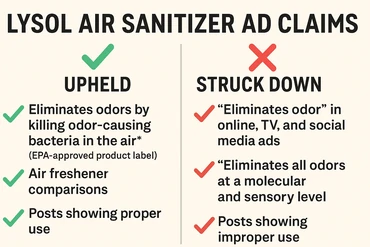A high-profile dispute gets a mixed response from BBB
April 29, 2025
Key takeaways
- BBB National Programs NAD rules that Reckitt must discontinue unqualified eliminates odor claims for Lysol Air Sanitizer
- Some claims upheld, including EPA-approved label and social media influencer posts showing proper use
- P&Gs challenge prompts scrutiny of odor and air freshener comparisons across ads, websites, and TikTok content
A high-profile advertising dispute between Procter & Gamble (P&G) and Reckitt Benckiser, the maker of Lysol Air Sanitizer, has led to a mixed ruling by the National Advertising Division (NAD) of BBB National Programs, which found that some claims were supported, while others must be discontinued or modified.
The case centered on whether Reckitts advertising accurately supported Lysol Air Sanitizers odor-elimination and comparative claims, including those made in commercials, websites, and social media posts.
Qualified vs. unqualified claims
The NAD upheld Reckitts use of the EPA-approved product label, which states that Lysol Air Sanitizer eliminates odors by killing odor-causing bacteria in the air. That claim, the division found, is supported and legally permissible under current EPA and state guidelines.
However, NAD concluded that unqualified eliminates odor claims, such as those made in commercials, online videos, and website copy, were too broad. These statements implied that the product could eliminate all odors, including non-bacterial ones, at a molecular and sensory levela standard for which Reckitts evidence fell short.
NAD specifically cited the St. Croix testing presented by Reckitt, which the panel found insufficient to substantiate such expansive claims. As a result, Reckitt has been asked to stop using eliminates odor phrasing that lacks clear qualifications.
Air freshener comparisons,social media scrutiny

P&G also challenged comparative claims made in advertising that implied Lysol was superior to air fresheners like Febreze. NAD found that the challenged ads did not overreach, as they fairly communicated that Lysol, unlike air fresheners, can eliminate airborne bacteria and viruses, without implying general superiority in all areas.
On social media, P&G objected to TikTok videos involving influencers and users. While posts by Lysols paid influencers were found to follow proper product usage instructions, a user-generated video misusing the product was flagged. NAD recommended Reckitt take reasonable steps to remove or correct that video, though Reckitt had already discontinued several such posts voluntarily during the review process.
Reckitts response
In an official advertiser statement, Reckitt disagreed with NADs stance on its odor elimination testing, but said it would accept the panels findings regarding the specific advertising reviewed.
While we maintain that our industry-standard testing supports our products performance, we accept NADs conclusions regarding the materials in question, the company stated.
NAD noted that Reckitt is free to make supported odor-reduction claims, provided they are accurately qualified and substantiated.
The decision underscores the importance of nuanced advertising in highly regulated categories, especially where public health, EPA oversight, and consumer expectations intersect. For companies like Reckitt and P&G, the ruling highlights the fine line between bold marketing and overstatement.
#Lysol #modify #Eliminates #Odor #claims #watchdog